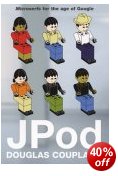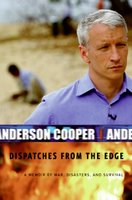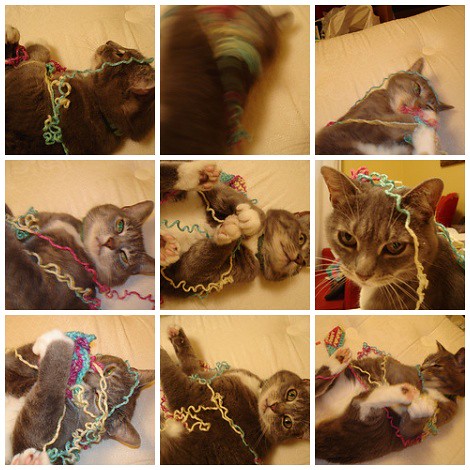This is not going to become a political blog (with or without street-corner ranting if you read the comments on my last post), nor is it going to turn into an Anderson Cooper blog, however when I read David Carr's article in the New York Times it made me mad. And that often makes for good blogging.
David Carr it seems, is jumping on the 'we're real journalists and therefore we hated Anderson Cooper's interview with Angelina Jolie' bandwagon. The basic gist of the piece is that both Cooper and Jolie are wealthy and dress nicely and therefore cannot possibly have anything of substance to say. She's an UNHCR Goodwill ambassador and he's a CNN anchor with extensive experience reporting tragedies on the African continent. What could they possibly have to talk about?
Carr writes, "Anderson Cooper. . .gave more than two hours of his program to Angelina Jolie for a two-hour infomercial fomenting an agenda -- saving Africa" Well to be precise, do the math, AC360 is a two hour show, so how Cooper gave MORE than two hours to Jolie is an act of metaphysics yet to be explained. But more to the point, Jolie wants to save Africa? What a terrible idea. How outrageously selfish of her to suggest it. Now I'll admit that a New York Times columnist like Carr is likely better researched than I am on most subjects, but last I checked Africa was still facing some major issues and could use some help. I've heard worse ideas.
If Angelina Jolie had come on the show talked about refugees for 5 minutes and then started fielding questions about Brad I could see Carr's point. But they talked about refugees. For two hours. There were reports from Uganda, vintage footage from Niger, live feeds from Darfur. It looked a lot like news to me. I was reminded of something I saw a few weeks back. Bono was offered a one day guest editorship of The Independent. His headline read:
NO NEWS TODAY*
and then in tiny print way down at the bottom of the page *Just 6, 500 Africans died today as a result of a preventable, treatable disease (HIV/AIDS)
Looks like news to me.
Like several other writers this week Carr chose to make snide reference to the clothing both were wearing for the interview. Jolie reportedly gave a third of her income away last year. Should she be required to give the rest of it away and dress in rags to better tell her story? He then went on to comment on her body art suggesting it seems that someone who changes her mind about a tattoo cannot be relied on to stay with anything else:
"Ms. Jolie proudly talked about having "Know Your Rights" as an alluring tattoo -- an homage to the United Nations refugee effort -- — but that same medium has also served as a signpost for her ex-husband, old What's-His-Name."
Maybe Carr was watching a different interview. In the one that I saw Cooper commented that he'd heard Jolie had "Know your rights" tattooed on her and she admitted that she did. She went on to say that she had once visited a prison in a tank top that showed the tattoo and it caused quite a stir. Hmm, incarcerated men and a tattoo about rights. . . yeah can't imagine why. I wasn't there, obviously, when she got the tattoo, but I'd be willing to guess that Jolie didn't pick "Know your rights" for its sex appeal.
My Director at work is fond of saying "any idiot can throw a rock". It takes no skill at all to poke holes in someone else's ideas. Get some decent boots and head over to Uganda Mr. Carr. I'm sure what you find there will make for a much more interesting column.
Wednesday, June 28, 2006
Thursday, June 22, 2006
hanging out in the JPod
 Okay Douglas Coupland, you're forgiven.
Okay Douglas Coupland, you're forgiven.Last summer I read Coupland's Girlfriend in a Coma, and I was mad. In place of his usual witty and introspective fiction was a whacked out tale featuring a deus ex machina ending that can only have come from a bad batch of BC Bud. When I heard that he had come out with a new book, and one that was said to be Microserfs for the Google set I was cautiously happy.
Microserfs for me is Coupland at his best. After being burned on Coma I hesitated, but only a little. JPod was worth the ride. In this novel Douglas Coupland brings together a group of video game programmers doomed to share a cubicle because of a glitch in the system. Their last names all start with J. That's all they have in common. But as they quickly learn, there's no way out of JPod.
This book had a great mix of tech stereo-types and lampooned local custom. One of the main characters has a Mom who's growing weed in the basement of their home in the British Properties while his Dad goes after the ever elusive speaking part. He's constantly filming on location in Cloverdale, mostly as an extra. I found myself laughing a lot while reading this.
The plot here is a little more far-fetched than Microserfs, but you have to give Coupland credit for writing a version of himself into the story. I was reading an article in Wired that said that Coupland had read so many strange things about himself on the internet -- he hates phones and never answers them! -- that he decided to create a character named Douglas Coupland who embodied them all. Very nice.
Wednesday, June 14, 2006
two days with Anderson Cooper
 I just finished reading Anderson Cooper's New York Times bestseller Dispatches from the Edge: A Memoir of War, Disasters and Survival and I'm impressed. It's not a title I would normally pick-up and it's certainly not something I would expect to finish in two days but that's a testament to the book itself.
I just finished reading Anderson Cooper's New York Times bestseller Dispatches from the Edge: A Memoir of War, Disasters and Survival and I'm impressed. It's not a title I would normally pick-up and it's certainly not something I would expect to finish in two days but that's a testament to the book itself.For me it started with a photograph. On the cover of the June 2006 issue of Vanity Fair there's a photograph that stopped me in my tracks. It's a close-up of a man, Anderson Cooper as it turns out, and he's not crying but you can see the water beginning to pool in the corners of his eyes. I stood there thinking "how in the world did they get that shot?". I bought the magazine and the article turned out to be an excerpt from Cooper's book. Having now read both I don't imagine that it was so hard for him to find something sad to think about.
If you do a little research on Anderson Cooper you'll quickly learn 4 basic things about him: his mother is a Vanderbilt, his father died when he was 10, his brother committed suicide 12 years later and he has some very strange, albeit committed, fans. Oh and he also has this day job where he's an anchor for CNN. Since when do CNN anchors have fans?
The interviews all seem to focus in on the sadness. In the book Cooper himself admits that he started going to wars and disasters because it was more comfortable to be where other people were hurting but I am surprised that so many of the interviews focus on just this one aspect. Time Magazine's Andrea Sachs sat down for 10 Questions with Anderson Cooper for this week's issue. I would have expected something a little better than "when did you realize your Mom was famous?" and "how did you feel when your father died". Maybe it's easier to stick to the script.
I don't know if I'd say that I enjoyed the book -- famine, war, tsunamis and hurricanes are hardly fun topics. But here at the end of it, I'm glad I read it. Cooper often speaks of trying to get people to remember what happened, to not forget, and reading the book is one way to do that. It's hard to wrap your head around suffering on the scale he has seen time and again but his writing style helps take you there. I got the feeling from time to time that he was holding back, but perhaps that was for my benefit as a reader. Throughout the book he talks about the ways people try to deal with tragedy -- soldiers, aid workers, reporters -- and I wonder if he had to edit himself a bit for those of us who haven't been there.
If I had a criticism of the book it would be this: pick a verb tense. Memoirs, traditionally, are written in past tense and this one keeps flicking back and forth between past and present tense. Maybe for a journalist who lives in telling stories that are happening now asking him to abandon present tense was too much to ask. Maybe it's so ingrained it's just part of how he tells the story.
It's a good book, I'd recommend it. Fair warning: this is not a book you curl up in bed with. I have a feeling it will also prove to be a book that stays with me. There are photos in the hard cover edition but mercifully they're mostly family shots and not field shots. The field shots have definitely been chosen carefully. There's one of Cooper sitting in the remains of a hotel in Sri Lanka mud and refuse and Christmas decorations still hanging from the ceiling. But given the stories, it's relatively clean.
It's been interesting reading some of his other articles. There is a levity and humour in them that isn't in the book. It would have been out of place in the book to be sure, but it's good to know that it's in there. I'm glad he didn't leave it behind in the field somewhere.
There's more to say, but I think it's another post.
Monday, June 12, 2006
slipping into summer
All the season finales are over. I've got 4 or 5 months to wait before I find out if Meredith with choose McDreamy or the vet or if George will ever get what he deserves. In the meantime I've been enjoying the absence. Tonight I sat in the living room working a New York Times crossword puzzle (although it's a Monday so it hardly counts) while Ceone sampled the world music offerings on iTunes. It's quiet and not quiet and I like it that way.
We headed down to the beach for sushi and gelato tonight. There's something undeniably summery about that. (And wonderfully Vancouver-ish about Japanese and Italian cuisine side by side and hand in hand.) I'm still wondering who the wedding couple are in the photo above the register at Dolce Gelato. One of these days I'll have to get around to asking Davide. He seems like an approachable guy I'm sure he won't mind. He's always smiling when we come in. Maybe if you spend your days surrounded by that much gelato there's a lot to smile about.
I can feel myself slipping into summer. Kendra's classes are winding down. I am jealous, again, of the weeks of rest she has ahead even though I know because I've witnessed it that she has already paid for each hour in the sun. There are a few long nights ahead for her. But it's almost summer. Almost. There's a new tank of gas under the barbecue, the flower beds have been weeded and are waiting. My parents will be here in just a few weeks. I have no idea how it can be time already, but I'm slipping into summer. I can feel it.
We headed down to the beach for sushi and gelato tonight. There's something undeniably summery about that. (And wonderfully Vancouver-ish about Japanese and Italian cuisine side by side and hand in hand.) I'm still wondering who the wedding couple are in the photo above the register at Dolce Gelato. One of these days I'll have to get around to asking Davide. He seems like an approachable guy I'm sure he won't mind. He's always smiling when we come in. Maybe if you spend your days surrounded by that much gelato there's a lot to smile about.
I can feel myself slipping into summer. Kendra's classes are winding down. I am jealous, again, of the weeks of rest she has ahead even though I know because I've witnessed it that she has already paid for each hour in the sun. There are a few long nights ahead for her. But it's almost summer. Almost. There's a new tank of gas under the barbecue, the flower beds have been weeded and are waiting. My parents will be here in just a few weeks. I have no idea how it can be time already, but I'm slipping into summer. I can feel it.
Thursday, June 08, 2006
flickrtoys, Furball and a field trip
 Sometimes you just need to play. Years ago a good friend of mine told me that his idea of a perfect day would be a blank canvas the size of the wall, paints and no brushes. I think there's a scene in Benny & Joon that's the same sort of idea, just fingers in paint, a lot of paint. I wonder if he ever got around to trying that? Play comes in many shapes and forms and I think grown-ups would do well to put down their pens and remember that.
Sometimes you just need to play. Years ago a good friend of mine told me that his idea of a perfect day would be a blank canvas the size of the wall, paints and no brushes. I think there's a scene in Benny & Joon that's the same sort of idea, just fingers in paint, a lot of paint. I wonder if he ever got around to trying that? Play comes in many shapes and forms and I think grown-ups would do well to put down their pens and remember that.Last Saturday three quarters of the House of Mirth headed into Vancouver for girly fun. There was a fund raiser at the Vancouver Museum in support of the Vancouver Food Bank. There was a desert competition, fancy cupcake bake sale and best of all students from the Blanche MacDonald Center were doing hair, make-up and hand massages to raise donations. We decided to play.
 Too funny. The BMC students were fantastic. Very personable and a lot of fun (especially when jogger or two happened to pass by the patio doors). I don't know how much money was raised in the end but we certainly enjoyed ourselves. Summer is coming. More time to play!
Too funny. The BMC students were fantastic. Very personable and a lot of fun (especially when jogger or two happened to pass by the patio doors). I don't know how much money was raised in the end but we certainly enjoyed ourselves. Summer is coming. More time to play!
Subscribe to:
Comments (Atom)

